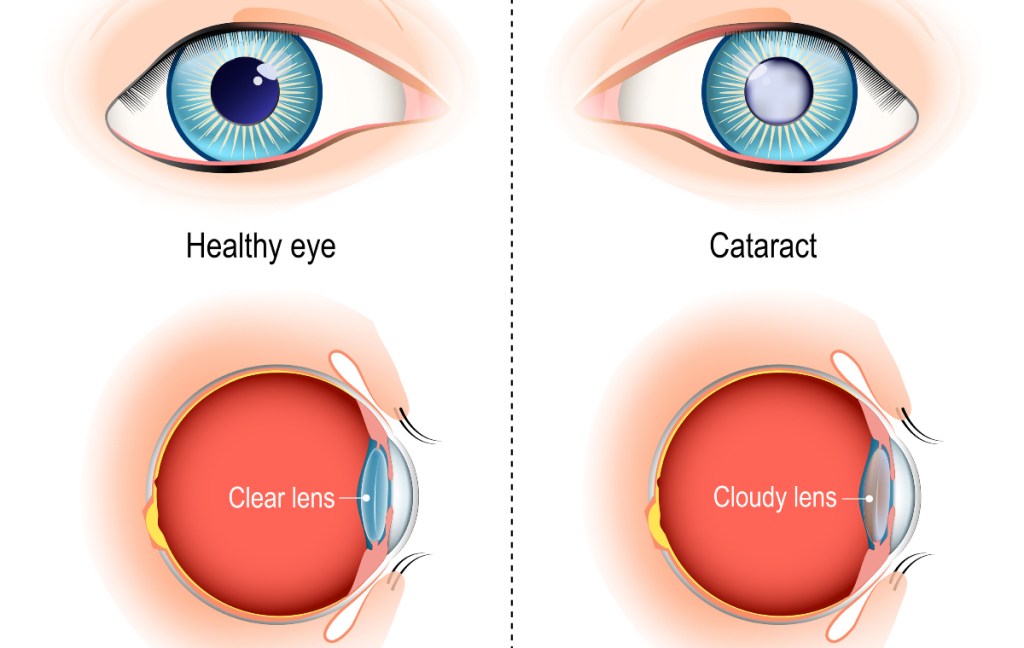Doctors Reveal the Snack That Cuts Your Risk of Vision-Clouding Cataracts in Half
Bonus: Borrowing a tip from A-list movie stars keeps your sight sharp for years to come

Feel like your eyesight isn’t as crystal-clear as it used to be? There’s a reason for that. After age 40, proteins in the lenses of your eyes can start clumping together, leading to vision-clouding cataracts. That may leave you wondering how to prevent cataracts naturally and keep your vision sharp for years to come.
While it’s not always possible to stop cataracts from forming, “steps can be taken for people in their 50s to slow cataract progression,” assures James Dello Russo, MD, an optometrist at NJ Eye Center in Bergenfield, NJ. Best of all, many the most effective strategies for preserving your vision are surprisingly simple!
What are cataracts?
Cataracts are cloudy areas in your eye lens, the clear part of your eye that helps focus light. They can start to form as early as your 40s and 50s, but it can be another couple decades before they become big enough to impact your vision, Dr. Dello Russo says. Around 40% of women have cataracts by age 70. By age 80, the number jumps to 71%.
Once cataracts start to impact your eyesight, you might start to notice symptoms like:
- Cloudy or blurry vision
- Colors appearing duller or faded
- Trouble seeing at night
- Trouble seeing in bright light, like bright sun or headlights
- Seeing a halo around lights
- Double vision
- More frequent glasses or contact prescription changes
Of course, cataracts aren’t the only problem that can impact your vision as you get older. Other common culprits include age-related macular degeneration and glaucoma. So if you’re having trouble seeing, you should visit your eye doctor to figure out the underlying culprit, advises Diane Hilal-Campo, MD, an ophthalmologist in Oakland, NJ. They can easily spot cataracts with a dilated eye exam.

Common causes of cataracts
Cataracts form due to normal changes in the eye that happen as we get older. “Most cataracts develop as a natural course of aging,” Dr. Dello Russo says.
The lens of your eye is clear when you’re young. Over time, they can turn cloudy and brown, which can impact your vision. While experts don’t fully understand why this happens, it’s thought that wear and tear causes the fibers of the lens to become damaged and lead to changes in your eyesight, Dr. Hilal-Campo says.
Some of this wear and tear may be unavoidable. But things that cause oxidative damage to the cells of your eyes can make it worse or cause cataracts to form sooner, she adds. This can include:
1. Sun exposure
You already know the sun’s UV rays can damage your skin and increase skin cancer risk. But it turns out they can also damage your eyes and increase your chances for cataracts. “Cumulative sun damage to lens proteins changes the structure in the lens, causing the lens to become cloudy over time,” Dr. Dello Russo explains.
2. Smoking
Cigarettes and tobacco create oxidative damage to your eyes, too. In fact, cigarette smokers are up to 3 times more likely to develop cataracts compared to those who don’t smoke.
3. Uncontrolled diabetes
High blood sugar damages the lens of your eye over time and increases your risk for cataracts, Dr. Hilal-Campo notes. In fact, some findings suggest that having diabetes can increase your cataract risk up to fivefold. (Click through for easy food swaps that reduce diabetes risk.)
4. Eye injuries
Injuries caused by blunt trauma (like a hard bump) or a sharp object may also harm the lens of your eye and raise your odds of developing cataracts later in life.
6. Medication use
Long-term use of corticosteroids can increase your cataract risk, Dr. Hilal-Campo says. How? They can potentially lead to changes in the proteins that make up your eye lens.
7. Family history
You’re more likely to develop cataracts if your parents or siblings have them. If you’re concerned about your family’s eye health history, let your eye doctor know.

How to prevent cataracts naturally
While it’s not always possible to guarantee you stay cataract-free, these simple tips help reduce your risk and slow the progression of cataracts that do form. Here, our experts’ top picks for the best ways to prevent cataracts naturally.
1. Pretend you’re an off-duty movie star
Make like a famous actor going incognito and don a hat and sunglasses whenever you leave the house (even when it’s cloudy). This simple habit can protect your eyes from up to 95% of the sun’s damaging UV rays, according to a review in PLoS One. Dr. Hilal-Campo recommends looking for sunglasses that are labeled UV 400, which offer the most protection. One to try: Dushine Polarized Sunglasses for Women (Buy from Amazon, $15.99). (Click through to learn how sunglasses can also thwart dry eye to improve your vision in 7 days.)

2. Snack on bell peppers
Eating 185 mg of vitamin C daily could slash your cataract risk by up to 50%, suggests one International Ophthalmology study. “Vitamin C is an antioxidant, which can help fight oxidative damage in the eye,” Dr. Hilal-Campo says.
Half a cup of sliced red bell peppers will give you 95 mg of C (that’s more than an orange!). Try pairing them with hummus for an afternoon snack. Other great sources of vitamin C include citrus fruit, strawberries, broccoli and kiwifruit.
As for vitamin C tablets or pills? Supplementing with C alone doesn’t seem to be effective for cataract prevention. And some research even links megadoses of vitamin C to an increased cataract risk. “Vitamin C from food might be easier to get into the structure of the eye,” Dr. Hilal-Campo adds.
3. Savor a salad
Enjoying a daily salad is Dr. Hilal-Campo’s go-to move for keeping her eyes healthy and cataract-free for as long as possible, since it helps her load up on antioxidant-rich veggies. People who eat at least 6.5 servings of vegetables daily have an 18% lower risk of developing cataracts compared to those who only get 2 daily servings, according to a study in the journal Eye. (Click through to learn how a diet rich in produce reduces your risk of vision-robbing macular degeneration, too.)
4. Stroll around the block
Age-proof your eyes with a walk in the park? Yes! Regularly engaging in moderate exercise like walking can reduce your cataract risk by 10%, reveals International Journal of Ophthalmology findings. Being active turns on genes that slow aging of the blood vessels and tissues in your eyes, making it an easy way to help prevent cataracts naturally.

5. Try a multivitamin
While single-ingredient supplements (like the vitamin C supplements mentioned above) don’t seem to help with cataracts, taking a daily multivitamin and mineral supplement can make a difference. In fact, it might reduce your cataract risk up to 66%, according to a review in Nutrients. The benefit might come from the combination of eye-boosting nutrients including vitamins A, C and E, says Dr. Hilal-Campo, who recommends Centrum Multivitamin/Multimineral Supplements to her patients (Buy from Amazon, $9.99).
6. Pop a piece of gum
Sounds surprising, but chewing a minty stick of gum just might help you prevent cataracts naturally. The stress hormone cortisol drives up your blood sugar, which can worsen oxidative stress and damage your eye lenses, Dr. Hilal-Campo explains. But popping a piece of gum when you’re tense can lower levels of cortisol and ease feelings of stress and anxiety while helping you feel more alert, according to one Psychology & Behavior study.
Prevent cataracts: When to talk to your doctor
Taking steps to prevent cataracts naturally is a great start toward keeping your vision sharp. But if you’re having a harder time seeing clearly or vision problems are making it tougher to do everyday activities, you should visit your doctor. Cataracts that get in the way of reading, driving, or watching TV can be successfully treated with surgery. “Recovery is usually very fast, and the majority of people who undergo cataract surgery are very satisfied with their vision,” adds Julia Giyaur, MD, an ophthalmologist at New York Laser Vision in New York City.
For more easy ways to keep your sight sharp:
Treating *This* Common, Sneaky Cause of Blurriness Can Improve Your Vision in 7 Days
Blurry Vision? Top Doc Reveals When It’s Cause for Concern — And How To Keep Your Sight Sharp
Eye Doc: Look *Here* While You Drive & 8 More Genius Tips to Improve Night Vision Behind The Wheel
This content is not a substitute for professional medical advice or diagnosis. Always consult your physician before pursuing any treatment plan.














